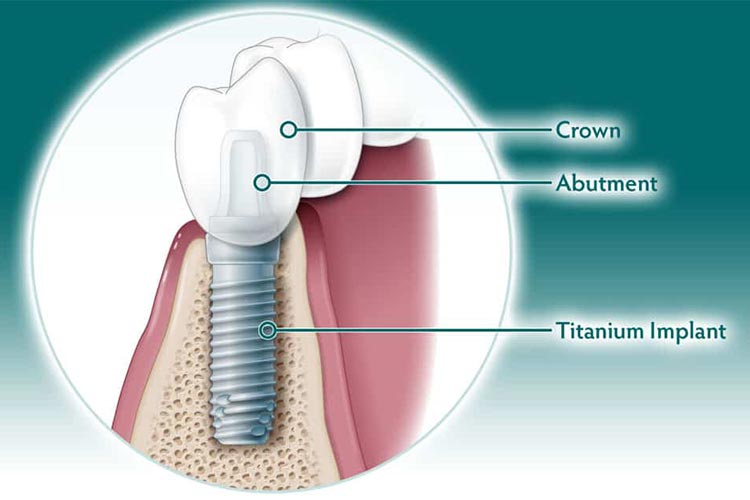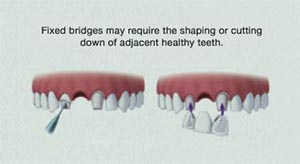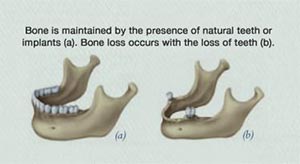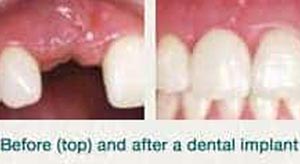Dental Implants
Dental Implants
For over 30 years, dental implants have been changing lives. Designed to provide a foundation for replacement teeth that look, feel and function like natural teeth, dental implants allow patients to laugh, speak, and smile with confidence. With dental implants, a person who has lost teeth regains the ability to eat virtually anything, knowing that teeth appear natural and that facial contours will be preserved. Implants are a team effort between an oral and maxillofacial surgeon and a restorative dentist, both being the best at what they do. While our doctors perform the actual implant surgery, initial tooth extractions and bone grafting, if necessary, the restorative dentist fits and makes the permanent prosthesis.

What Are Dental Implants?
The dental implants themselves are tiny titanium posts that are surgically placed into the bone where teeth are missing. These metal anchors act as tooth root substitutes. The bone bonds with the titanium, creating a strong foundation for artificial teeth. Abutments, that look like small posts, then allow artificial teeth to be attached to the implant.
Implants also help preserve facial structure, preventing bone deterioration that occurs when teeth are missing.
Dental Implants Can Last a Lifetime
Dental Implants vs. Bridges




What Are the Benefits of Implants
- They look better and more natural
- Ability to eat virtually anything
- Implants also help preserve facial structure, preventing bone deterioration that occurs when teeth are missing
- Dental implants never slip, make embarrassing noises or decay like teeth anchoring fixed bridges
- Because dental implants fuse with the jawbone, bone loss is generally not a problem
- With an overall 95% success rate and almost 50 years of clinical research to back them up, dental implants are frequently the best treatment option for replacing missing teeth
- Fixed bridges and removable dentures usually need to be replaced every seven to 15 years, implants can last a lifetime
The Surgical Procedure
For most patients, the placement of dental implants involves two surgical procedures. First, implants are gently placed within your jawbone. For the first three to six months following surgery, the implants are beneath the surface of the gums, gradually bonding with the jawbone so that there will be a stable anchor for the man-made tooth. During this time period, you should be able to wear temporary dentures if desired, and progress to eating a normal diet with time.
After the implant has bonded to the jawbone, the second phase begins. Our surgeons will uncover the implants and attach small posts to the implants that will act as anchors for the artificial teeth. When the artificial teeth are placed, these posts will not be seen. The entire procedure usually takes six to eight months. Most patients experience minimal disruption in their daily life. There are even situations where the implants can be placed at the same time as a tooth extraction, further minimizing the number of surgical procedures. Advances in dental implant technology have made it possible, in select cases, to extract teeth and place implants with temporary crowns during one visit. This procedure, called “immediate Provisionals,” greatly simplifies the surgical process.
What type of prosthesis are available?
A single prosthesis (crown) is used to replace one missing tooth – each prosthetic tooth attaches to its own implant. A bridge can replace three or more teeth and may require only two or three implants. A complete dental prosthesis replaces all the teeth in your upper or lower jaw. The number of implants varies depending upon which type of complete prosthesis (removable or fixed) is recommended. A removable prosthesis (over denture) attaches to a locator abutment. Think of a locator abutment as a ball shaped trailer hitch. A fixed prosthesis is permanent and removable only by the dentist.
Dr. Holmes, Dr. Clark and Dr. Smith perform in-office implant surgery in a hospital-style operating suite, thus optimizing the level of sterility. Inpatient hospital implant surgery is for patients who have special medical or anesthetic needs or for those who need extensive bone grafting from the jaw, hip or tibia.
Why select dental implants over more traditional types of restorations?
There are several very strong reasons! Why sacrifice the healthy structure of surrounding good teeth to bridge a space? This tooth-supported bridge is reduced in function and has a limited lifespan. Why suffer the maladies of antiquated removable partial dentures? In addition, not only is removing a “partial” at night inconvenient, they are poorly functional and rather embarrassing when they slip and fall out.
Am I a candidate for dental implants?
The best way to provide you with a true estimate of the cost determine is to have an examination with one of our oral surgeons. Clark Holmes Smith Oral Facial Surgery offers dental implant consultations as an opportunity to learn more about dental implants and determine a customized treatment plan to best meet your needs. Call one of our four five locations to schedule your dental implant consultation today.
Why dental implants?
Once you learn about dental implants, you finally realize there is a way to improve your life. When you lose several teeth – whether it’s a new situation or something you have lived with for years – chances are you have never become fully accustomed to losing such a vital part of yourself.
Dental implants can be your doorway to renewed self-confidence and peace of mind.
A Swedish scientist and orthopedic surgeon, Dr. Per-Ingvar Branemark, developed this concept for oral rehabilitation more than 35 years ago. With his pioneering research, Dr. Branemark opened the door to a lifetime of renewed comfort and self-confidence for millions of individuals facing the frustration and embarrassment of tooth loss.
What type of anesthesia is used?
Most dental implants and bone grafts can be performed in the office with local anesthesia with or without nitrous oxide or IV sedation. Most patients elect IV sedation because of the comfort and peace of mind.
Do implants need special care?
Once the implants are in place, they will serve you well for a lifetime if you take care of them and keep your mouth healthy. This means taking the time for good oral hygiene (brushing and flossing) and keeping regular appointments with your dental specialists. Other healthcare issues will be addressed if indicated to maximize the lifespan and success.
